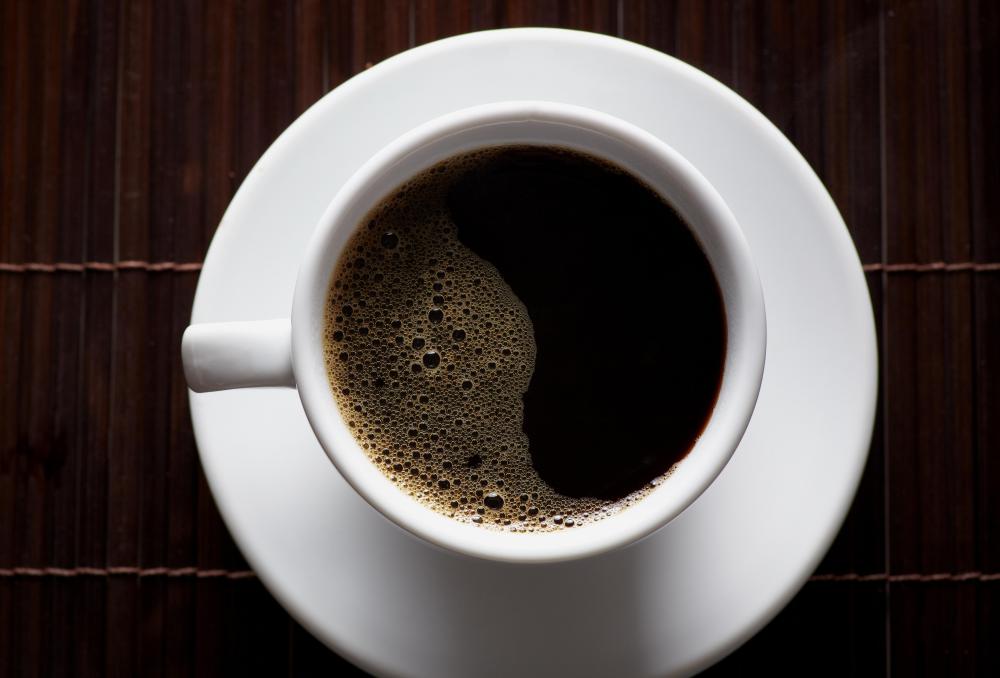At WiseGEEK, we're committed to delivering accurate, trustworthy information. Our expert-authored content is rigorously fact-checked and sourced from credible authorities. Discover how we uphold the highest standards in providing you with reliable knowledge.
Is Caffeine a Drug?
As caffeine is unregulated in most countries of the world and readily consumed daily by people of all ages, many people wonder if it is proper to call caffeine a drug. Caffeine is found in many common food and drinks, including chocolate, tea, and of course coffee. It is a stimulant with observable effects on the brain and nervous system and addictive qualities as well. Thus, it is perfectly proper to call caffeine a drug, even though it does not have the social stigma associated with most non-prescription drugs.
Caffeine is produced by many plants around the world, apparently as a natural pesticide; ingesting it can paralyze or kill some insects. The use of the coffee bean as a stimulant was a closely guarded secret in ancient Ethiopia, although a similar effect from tea was already well known in China. These substances became important to international trade and commerce in the age of exploration and after. Coffee houses were in operation around the world by the 17th century.

Caffeinated sodas such as Coca-Cola became popular in the late 19th century. At that point, even the U.S. government debated whether to classify caffeine as a drug. A Coca-Cola shipment was seized by government officials in 1911 amid concerns that caffeine, a drug, was being fed to unsuspecting customers. Coca-Cola had removed the drug cocaine from its soft drink a decade earlier. The Coca-Cola Company was cleared of any wrongdoing, but thereafter food and drink manufacturers were required to list caffeine in product labeling, as it was a habit-forming substance.

Another factor to prove caffeine a drug is its effect on personality and behavior. While its stimulating effects are well known, it can also increase metabolism and heart rate and constrict blood vessels in the brain. Regular users can experience mild withdrawal symptoms such as headaches and irritability when caffeine is not available. Those unaccustomed to caffeine can experience nervous tremors and increased need to urinate after consumption. These physical and mental effects are shared by other psychoactive drugs and stimulants.

Is caffeine a drug? The 90 percent of Americans who consume it daily might beg to differ. Even devout Muslims, Christians, and Jews who avoid intoxicants would be hard-pressed to do without their daily java. The simple facts, however, demonstrate that not only is caffeine a drug, it is the most widely consumed drug on the planet. It's small wonder, then, that the ancient Ethiopians wanted to keep it for themselves.
AS FEATURED ON:
AS FEATURED ON:















Discussion Comments
I agree with this article, I also heard that caffeine is not really a stimulant, that it makes us addicted, just like a drug. After we are addicted, we need our drug, caffeine, to feel as we normally would.
So what this means is that caffeine doesn't give us energy beyond our threshold but rather lets us reach it. The crazy part is that we used to reach that threshold without consuming anything before we started having caffeine.
And all this time I was thanking my cup of coffee for helping me wake up in the morning.
I'm an anxiety patient and was doing some reading to understand more about this disorder. I noticed that there are many medical sites which mention that anxiety patients should reduce the consumption of caffeine. I looked into the connection between anxiety and caffeine a bit further and ran into an interesting study.
This study was done on a group of anxiety patients. Caffeine was withheld from these individuals for a week and after the week was over, they were given a cup of coffee. Most of the patients could not differentiate the caffeine's side effects from their anxiety symptoms and reported that they were experiencing anxiety.
I paid attention to what I'm feeling after I have my coffee and realized that it was triggering my anxiety as well. Now I'm just having herbal teas and green tea which is lower in caffeine.
Post your comments